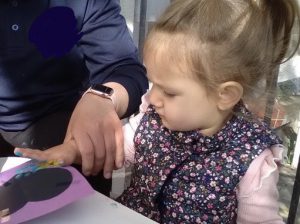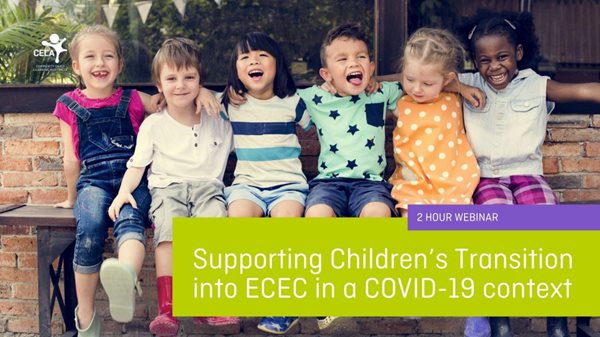Beth Sebesfi is an early childhood teacher and mother of three young daughters. From time to time she shares with us the professional insights arising from her personal experiences with children at work and home.
Today’s story is a reflection on intention versus learning outcomes, particularly when it comes to artistic expression in early education (and the hotly debated topic of handprint art…).
"You will not be good teachers if you focus only on what you do and not upon who you are” – Rudolf Steiner.
Beth writes…
Our role, from the moment children come into our care, is to share and advocate for their rights as global citizens. We are their voice when they have none, educators are the conduit through which the potentials of the world are brought to children, and the potentials of the child’s self is expressed to the world.
It’s about integrity
I believe that as teachers we need to keep our standards high and build capability. Never waiver in our beliefs, keep putting the children first. Ruffle the feathers that need to be ruffled and they’ll thank you later.
We have to be up for the fight.
Looks like a handprint, feels like a handprint, so should we call it a painting?
Then one day, my youngest daughter ran to meet me at her classroom door with a look of sheer joy on her face. I bundled her up in my arms and wiped a streak of blue paint instinctively from her cheek.

“Buddy! How was your day!”
“Painting!”; her big brown eyes brimmed imploringly.
“You did a painting!”
Layla showed me her hands, holding her palm out flat to detail what she meant. “Tiku-tiku-tiku!”, she cooed, tickling one hand with another.
Shelving what I knew she was telling me in the back of my mind, I tried to clarify. “You did a finger painting!”
Layla slapped her hands together. “Done!”.
I sighed gently, trying not to dull her enthusiasm. If I was hearing Layla correctly, her caring, engaging and dedicated educators had painted her palm, pressed it on a piece of paper and called it a painting.
I thanked the team (sincerely), and we left with the artwork.
Layla loved it but… what would Malguzzi say?
This is so not a big deal. I know, truly I know, that there are worse things than handprint craft. In my heart of hearts, I know that when I hold my team to account for a practice that I deem restrictive when we call it disrespectful to hold a child by the wrist and press their palm to paper, cheer for their effort and then say you’re welcome, it’s more of a learning experience than a deal-breaker. I know this.
So, of course, I wasn’t going to say anything.
But…I also wasn’t going to share the photos with my mum. And I wasn’t going to send my husband the card. Why would I send him something made by the staff? I don’t recognise Layla by her handprint. There’s hardly anything Layla about this… but I mean… He would probably love it. And she clearly loved it.
Well… she loved the engagement. She loved the “tickle tickle tickle” part. And I loved the effort that the educators had gone to just to make a memory for Matt.
I can feel you judging me.
Malaguzzi would push me to ask, where is the space for the hundred languages when they can’t even hold the brush? Pikler would ask me to take away the high chair, let go of Layla’s wrist, let her move, let her speak and truly listen to what she told me. Montessori would ask me what Layla could possibly learn when the focus was on the product, and not the endeavour.
Yet my Mum brain was just so thankful. Layla was happy. Layla was cared for. Layla felt belonging. Layla felt safe.
An expression of care and dedication?
I consider myself a good teacher. Part of being a good teacher is knowing that critical reflection on practice and pedagogy should always leave space for uncertainty.
I also consider myself a bit of a nervous mum, and part of being a bit of a nervous mum is wanting to remove any and all elements of uncertainty from your child’s life immediately, and indefinitely.
The first learning outcome of the Early Years Learning Framework is that Children feel safe, secure and supported. Layla’s educators are a team of experienced carers who are all, like me, mothers themselves.
From seeking to see through the lens of the team’s culturally diverse perspectives, I have learned that close involvement from adults, a hand to guide the brush, a gentle coo of “tickle tickle tickle”, is an expression of care and dedication. To leave an infant to paint without guidance, to see them create mess, could be interpreted as a lack of connection from the adult. For these educators, this experience was a clear example of that safety, security, and support.
I saw it differently.
Advocating for open exploration
It’s ok to wonder why we think the way we do and to keep wondering without the promise of an answer.
So I didn’t leave it alone.
I sent Layla back to her early learning centre with an extra change of clothes. I thanked the team for the card and shared my love of mess, Layla’s love of sensory play, our family’s experience of finding enjoyment in free expression and creativity and asked if they could make space for more open exploration in the curriculum.
We listened to each other, and we heard each other, because of our shared love of Layla.
Children have the right to have advocates. I truly believe this is our role as educators. Advocacy, however, does not simply mean a single message from a single voice.
Our understandings and value systems are dynamic and complex and built over time.
We must be prepared to reflect on our pedagogy, our practice and our decision making to make space for uncertainty.
Shared beliefs are not universal beliefs
Making space for new ideas
I implore you to make space for new ideas. When you ask for parent input, be prepared to feel disrupted by the answer. Enjoy the opportunity to change and grow as a leader. Build partnerships with a common goal, and always keep the children’s rights at the forefront.
Sometimes, the most worthwhile argument is the one we have when we question ourselves. We just have to be up for the fight.

NEW TRAINING – NESA REGISTERED PD
+Presented by Associate-Professor Cathrine Neilsen-Hewett, Academic Director of the Early Years at the University of Wollongong+
The current COVID-19 context presents unique challenges as to how we approach educational transition. For the majority of young children across Australia, this transition experience comes off the backdrop of change. While life is full of changes – too much change can challenge, it can unsettle, it can cause stress and grief.
This highly relevant and engaging training session will address key components of effective ECEC transition and how these can be addressed within COVID restrictions.